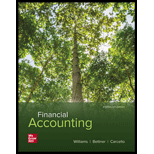
Concept explainers
a.
Compute the payback period of each proposal.
a.
Explanation of Solution
Capital budgeting:
Capital budgeting is a process by which the management can plan and evaluate the investment proposal of plant assets.
Payback period:
Payback period is the expected time period which is required to recover the cost of investment. It is one of the capital investment method used by the management to evaluate the proposal of long-term investment (fixed assets) of the business.
Compute the payback period for Snow –making equipment.
Therefore, the payback period for Snow –making equipment is 4 years.
Compute the payback period for Chairlift equipment.
Therefore, the payback period for chairlift equipment is 4.5 years.
Working Notes:
Calculate the
Calculate the incremental annual
| Particulars | $ |
| Incremental annual revenue of investment | 40,000 |
| Less: Incremental annual expenses of investment | 15,000 |
| Incremental annual income of investment | 25,000 |
| Add: Depreciation expense (1) | 6,250 |
| Incremental annual cash flow of investment | 31,250 |
Table (1)
(2)
Calculate the depreciation expense incurred during the current year for chairlift equipment:
Calculate the incremental annual cash flow of investment for chairlift equipment:
| Particulars | $ |
| Incremental annual revenue of investment | 54,000 |
| Less: Incremental annual expenses of investment | 19,000 |
| Incremental annual income of investment | 35,000 |
| Add: Depreciation expense (3) | 5,000 |
| Incremental annual cash flow of investment | 40,000 |
Table (2)
(4)
b.
Compute the return on average investment of each proposal.
b.
Explanation of Solution
This financial ratio evaluates how efficiently the assets are used in earning income from operations. So, ROI is a tool used to measure and compare the performance of a units or divisions or a companies.
Compute the return on average investment for Snow-making equipment:
Therefore, the return on average investment for Snow- making equipment is 40%.
Compute the return on average investment for chairlift equipment:
Therefore, the return on average investment for chairlift equipment is 38.89%.
c.
Compute the
c.
Explanation of Solution
Net present value method:
Net present value method is the method which is used to compare the initial
Calculate the net present value for Snow-making equipment, and assume annual discount rate is 20% as follows:
| Particulars | Amount in $ |
| Net present value: | |
| The discounted present value of the incremental annual cash flow of the investment discounted at 20% for 20 years is ($31,250 × 4.870) | 152,188 |
| Less: Cost of investment | 125,000 |
| Net present value | 27,188 |
Table (3)
Therefore, the net present value for Snow-making equipment is $27,188.
Calculate the net present value for chairlift equipment, and assume annual discount rate is 20% as follows:
| Particulars | Amount in $ |
| Net present value: | |
| The discounted present value of the incremental annual cash flow of the investment discounted at 20% for 36 years is ($40,000 × 4.993) | 199,720 |
| Less: Cost of investment | 180,000 |
| Net present value | 19,720 |
Table (4)
Therefore, the net present value for chairlift equipment is $19,720.
d.
Discuss the nonfinancial factors should be considered.
d.
Explanation of Solution
- The management of Mountain J should analyze the best investment opportunity available to its customers. It must also try to determine whether usage of long lift line is better than the short lift line at the time of adequate snow coverage.
- Management should undergo a marketing study about customers’ expectations. Moreover, the management should also consider the resort’s existing chairlifts and their weather pattern and also should identify the best alternative investment opportunities.
e.
Recommend the best proposal suitable for the capital investment for the Mountain J.
e.
Explanation of Solution
- The management should opt for making investment in snow-making equipment. Investing in snow-making equipment helps the management in having shortest payback period, a greater return on average investment and helps to have a higher to present value.
- Skiers mostly try to tolerate to usage of long lift lines when there is good snow condition, than the short lift lines with poor snow conditions. The management can concentrate on future investment of high speed chairlift, after installing the snow-making investment equipment.
Want to see more full solutions like this?
Chapter 26 Solutions
Financial Accounting
- How much will cypress need to borrow during December?arrow_forwardThe actual cost of direct materials is $37.50 per pound, while the standard cost per pound is $35.25. During the current period, 5,200 pounds were used in production. What is the direct materials price variance?arrow_forwardPlease provide the accurate answer to this financial accounting problem using valid techniques.arrow_forward
- I am searching for the correct answer to this financial accounting problem with proper accounting rules.arrow_forwardWhat amount of ending finished goods inventory will be reported on the balance sheet under variable costing?arrow_forwardI am looking for the correct answer to this financial accounting question with appropriate explanations.arrow_forward

 AccountingAccountingISBN:9781337272094Author:WARREN, Carl S., Reeve, James M., Duchac, Jonathan E.Publisher:Cengage Learning,
AccountingAccountingISBN:9781337272094Author:WARREN, Carl S., Reeve, James M., Duchac, Jonathan E.Publisher:Cengage Learning, Accounting Information SystemsAccountingISBN:9781337619202Author:Hall, James A.Publisher:Cengage Learning,
Accounting Information SystemsAccountingISBN:9781337619202Author:Hall, James A.Publisher:Cengage Learning, Horngren's Cost Accounting: A Managerial Emphasis...AccountingISBN:9780134475585Author:Srikant M. Datar, Madhav V. RajanPublisher:PEARSON
Horngren's Cost Accounting: A Managerial Emphasis...AccountingISBN:9780134475585Author:Srikant M. Datar, Madhav V. RajanPublisher:PEARSON Intermediate AccountingAccountingISBN:9781259722660Author:J. David Spiceland, Mark W. Nelson, Wayne M ThomasPublisher:McGraw-Hill Education
Intermediate AccountingAccountingISBN:9781259722660Author:J. David Spiceland, Mark W. Nelson, Wayne M ThomasPublisher:McGraw-Hill Education Financial and Managerial AccountingAccountingISBN:9781259726705Author:John J Wild, Ken W. Shaw, Barbara Chiappetta Fundamental Accounting PrinciplesPublisher:McGraw-Hill Education
Financial and Managerial AccountingAccountingISBN:9781259726705Author:John J Wild, Ken W. Shaw, Barbara Chiappetta Fundamental Accounting PrinciplesPublisher:McGraw-Hill Education





